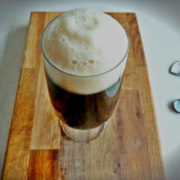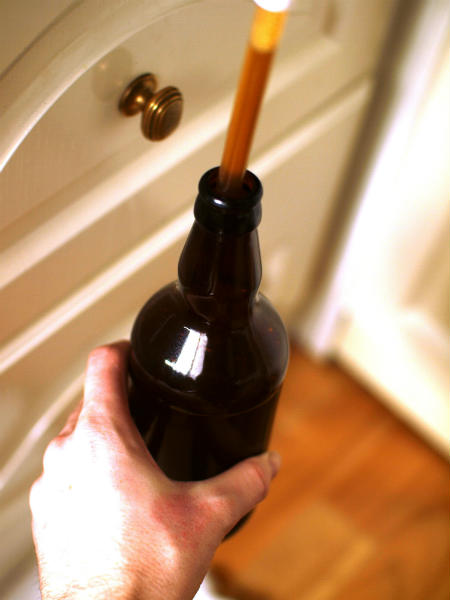Small Batch Home Brew Bottling & Video
Bottling beer may be the least favourite aspect of brewing for many people. I have to admit it can be tedious at times, you can’t really complain though when you end up with a case full of delicious beer.
There are ways to make the process simple and pain-free. I rarely keg any beer I make and always opt to bottle. I like to be able to stick a couple of bottle in the fridge, ready for any moment, take them to friends places or just grab a few to take to the beach. To make bottling easier it’s good to be prepared and have the right tools.
Following on from the video I made a couple of weeks ago, where I made a small batch of Milk Stout. It is now time to bottle it. As I filmed the making of the beer it is only right that I film the packaging of it.
.
Table of Contents
Key Points From The Video:
- Start with clean bottles
- Use no-rinse sanitiser if possible
- Sanitise everything
- Although optional, bottling tools are a huge help
- Don’t suck a syphon to get it started – Use this guide if you don’t know how
One of the great things about making small batches of beer is that when it comes to bottling, you know you only have half the amount of bottles to clean, sanitise and fill compared to a 5 gallon batch. Brew these small batches every couple of weeks and before long you can have a selection of 5 or 6 different bottled beers all available whenever the mood takes you.
Start With Clean Bottles
There is nothing worse than having to clean bottles that have been sat around with old dregs in. If you intend to reuse beer bottles then the best thing to do is rinse them out as soon as you’ve poured a beer. If you rinse them with warm water, allow to drain and dry and then store them away, you’ll be ready to bottle at a moment’s notice.
If your bottles are dirty or full of yeast sediment (or worse) it’s a case of soaking the whole lot in an oxy-cleaner or bleach solution and then getting out the bottle brush to scrub the inside clean, then rinsing out the bottles. Trust me, this can be a lot of work so in future just rinse the bottles as soon as you’ve poured a beer out. Check out this bottle cleaning guide on more in depth advice on cleaning bottles.
No-Rinse Sanitiser
When I first started brewing there was no commercially available sanitiser, available in the UK that didn’t need a thorough rinsing. This effectively doubled the work you had to do when sanitising bottle as well as pretty much everything else that comes into contact with a beer. Using a no-rinse sanitiser, such as Starsan means a couple of squirts in a bottle, let it drain and you’re good to fill it up with beer.
The foam the sanitiser leaves can be worrying but trust me, non-rinse sanitisers break down into harmless compound fairly rapidly without tainting the beer.
Bottling Tools
The three main tools I recommend everyone should get if they are bottling beer are; a bottling tree, a bottle rinser and a bottling wand.
Three super simple pieces of equipment that are pretty inexpensive also. These three items can cut a serious amount of time and hassle out of bottling beer and improve the quality of your bottled beers. I never want to go back to the time when I didn’t have these three things and I’ll admit that I spent a few years bottling beer without these helpful aids thinking they were gimmicky rubbish.
I have written quite a lot about bottling before, it is an area though that is overlooked. It takes practice to get good at it and it something you have to do whether it’s your very first batch, or if it’s your 100th batch. A beer can be good coming out of the fermenter but if you mess up whilst bottling and introduce oxygen or don’t sanitise properly the beer becomes unstable.
Hopefully you can see just how simple bottling beer can be from the video and how taking your time and keeping thing simple and sanitary can ensure you have a perfect bottled beer.





Hi Neil ,thank you for your videos,posts and articles I enjoy them and use a lot of what you provide.So far I have only done bag brewing and kits.I also have three home made stills and distill my own alcohols.I live in South Africa.
Regards
Trevor
Thanks, Trevor. Beer kits and brew in a bag are great ways to get into making your own beer. I have no experience with distilling but am interested in the process. Thanks for taking the time to comment.